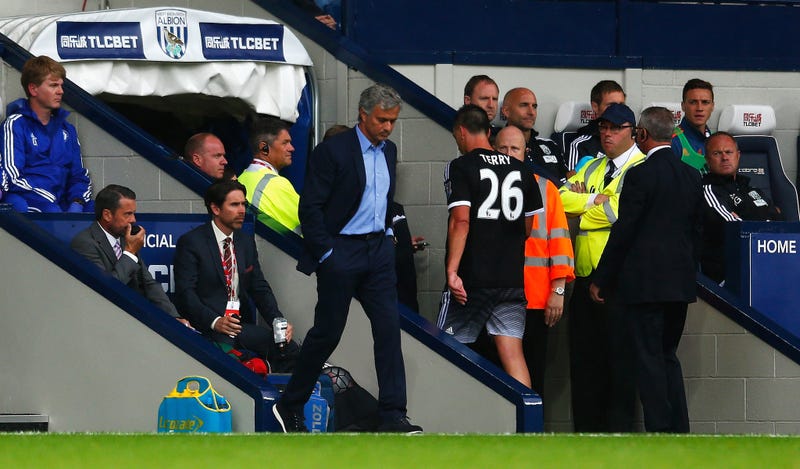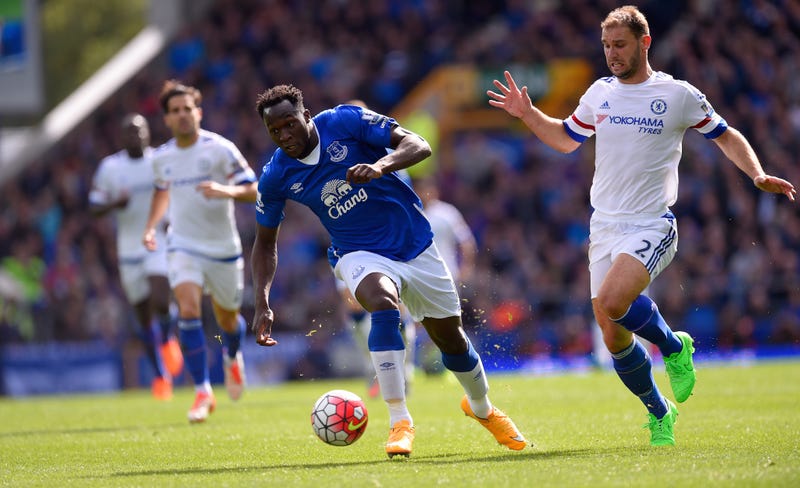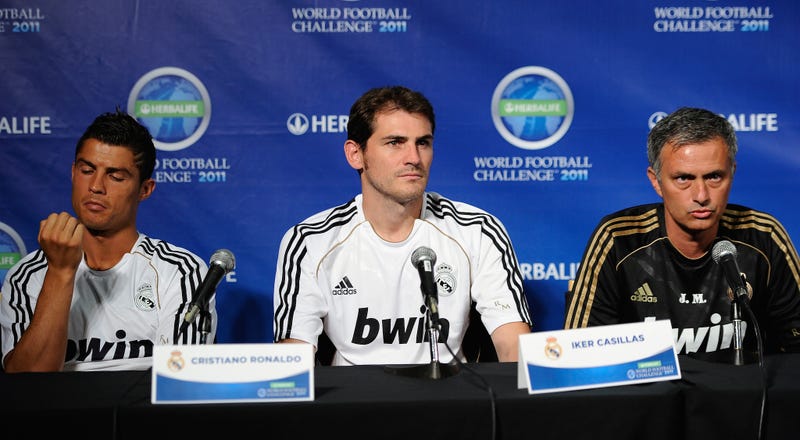
It was inevitable that Chelsea’s astoundingly poor performances and results so far this season would lead to some level of internal strife inside the club. We now have confirmation of this, with sources in the team describing a rift between the players and José Mourinho to two different papers.
The Guardian and the Telegraph both published nearly identical stories about Chelsea players’ discontent. Seriously: they repeat each other almost verbatim in what are ostensibly two separate, independently-reported pieces. Compare the Guardian’s first paragraph—
Concern is growing within the Chelsea dressing room at the perceived scapegoating of certain players by José Mourinho after the champions’ desperately poor start to the season. The decision not to take Oscar and Loïc Rémy to Porto in midweek and the continued absence of John Terry from the starting lineup are understood to have surprised senior squad members.
—to how the Telegraph’s opens:
Jose Mourinho is facing a battle to prove he is not scapegoating the wrong players for Chelsea’s disastrous start to the season.
Chelsea manager Mourinho left Oscar, Loic Remy and Radamel Falcao in England for Chelsea’s Champions League defeat to Porto, while captain John Terry remained on the substitutes’ bench.
The scapegoating claim seems to be the most worrisome bit of Mourinho’s management in the players’ minds. After playing every single minute in last season’s Premier League-winning campaign, Terry was dropped early on this season after the club’s multiple defensive lapses. The Chelsea captain started the first three league games. In the second match of the season, he was yanked at halftime in the Blue’s 3-0 spanking at the hands of Manchester City; in the third, he was red carded less than an hour into the game. Since that dismissal in late August, Terry has only started once for Chelsea in the Premier and Champions Leagues.

The reports remark upon the Chelsea players’ (and fans’, for that matter) bemusement at this turn of events. While Terry’s slow-footedness did appear to be a liability against the array of speedsters the EPL teems with, the most obvious weak link along the back line has been Branislav Ivanović, who’s been gobbled up by practically every left winger he’s faced this year. In spite of this, Ivanović has kept his place in the team and starts almost every match. This lack of consistency in who’s been blamed for the squad’s defensive woes (though it should be said that Mourinho has had nary a bad word publicly for Terry) has struck the players as “surprising” according to the Guardian, while being met with “disbelief” per the Telegraph.
It’s not only Mourinho’s choice of defenders that has the players questioning their manager’s decision-making. Oscar—the midfielder who’s been injured for much of this season and was pegged by many as the missing piece that, when implemented back in the lineup, would make everything work again—and Loïc Remy were not even included in the squad for Tuesday’s Champions League match. While Mourinho has claimed this was nothing more than part of a regular rotation policy, the locker room has associated that decision with his comments after last weekend’s disappointing draw at Newcastle. From theTelegraph:
Mourinho insisted that his team selection for Tuesday night was not a form of punishment for Oscar, Remy or on-loan Falcao, and the Portuguese has consistently refused to publically criticise individuals this season.
But having seen Mourinho complain about the “unstable attitudes” of some unnamed players, the view from inside the camp is that Oscar and Remy paid the price for the first half performance against Newcastle United last weekend, which Mourinho rated as “minus one.”
The Telegraph article brings up the fact that Oscar and Remy were both linked to transfers away from Chelsea in the last window, and goes on to report that neither pushed all that hard for a move. However, feeling unwanted at the club now, they may be mulling a change of tack either in January or next summer, which at least in Oscar’s case has distressed some teammates:
It remains to be seen whether or not Chelsea will be able to do the incoming business that would allow Oscar and Remy to move in the January transfer window, but the pair are not optimistic they will last past next summer.
Mourinho’s reservations over Oscar have confused some of the Brazilian’s team-mates, who believe the 24-year-old is vital to the side playing cohesively.
This whole scenario is fairly confusing, especially since some of Mourinho’s behavior seems to make sense, while some of it leaves you scratching your head.
One of the biggest fallacies in soccer is the idea that a team’s defensive quality is determined principally by the quality of its defenders. In actuality, it’s never as simple as that; defending and attacking are inextricably linked and all 11 players on the pitch affect both aspects of the game through their play.
The quicker and better-passing Kurt Zouma could solidify a creaky defense and ensure some much-needed control of games at the expense of the popular and well-regarded Terry; even if he did, though, he could well just end up watching Ivanović get skipped by for the umpteenth time. It’s a little strange that, even if Mourinho doesn’t think Ivanović is the crux of Chelsea’s defensive problems, he’s still yet to even attempt making a change there if only to see whether something takes.

The Oscar situation is similarly curious. You’d think, seeing the way Oscar sprints his legs off in that central attacking midfield spot up and down the pitch, seeking to cut out opposing attacks with the same intensity as he tries sparking Chelsea ones, that the Brazilian would be one of Mourinho’s favored sons. Instead, not only was Oscar dropped from the squad on Tuesday, he has been regularly held out of big games going back to last season.
In those matches Mourinho has preferred to move Cesc Fàbregas—who wouldn’t know where to position himself defensively if he had one of those video game arrows that point you to where you should be, and probably wouldn’t run that hard to get there anyway—a little further up the pitch into Oscar’s position and to bring in another, more defensively-sound parter for Nemanja Matć. With his age and ability, Oscar should feel like one of the club’s most precious assets rather than a rotation option who might need to leave town to get the appreciation he desires.
The particulars here don’t really matter much, though. More than anything else—more than the players’ and the manager’s differing tactical or personnel ideas, or their divergent beliefs about man management, or their views on which players should and should not be looking at the front door—Chelsea’s biggest problem is simply that they aren’t winning.
Mourinho is often described as both fiercely loyal and ruthlessly pragmatic, a man who will bring “his guys” along with him wherever he finds himself coaching but will, when a tough decision needs to be made for the good of the team, in no way hesitate to make it. The media often said—when his approach wore thin with the Spaniards at Real Madrid, for example—that this militaristic quality of his style was especially effective in England, where players are predisposed to battlefield rhetoric and fiery, dictatorial managers. Where Sergio Ramos would feel some kind of way about a club legend like Iker Casillas being cast aside as if he were unproven roster filler, the theory went, John Terry would never break the chain of command like that.
We’re now seeing that what really set England apart from other places where Mourinho has run afoul with the dressing room is that in the Premier League, he has always been seen as—and been—a winner. There’s not much you can say about the coach’s managerial tactics when he regularly and with great flourish lifts league trophy after league trophy. So where in 2005 John Terry might not have said word one about a Mourinho lineup he disagreed with as the two marched toward their second consecutive EPL title, the 2015 version might feel more emboldened to broadcast his displeasure when the team has already blown their title defense a month into the season.

In that sense, what’s most interesting isn’t which side is right or wrong, but how this will play out. In many ways we’ve seen this situation before. The powerful voices in Real Madrid’s locker room didn’t take too well to many of Mourinho’s strategies, and often made these disagreements public by leaking them to the press—which is exactly what appears to have happened here. The combination of some of his troops bristling at his commands and their temerity to run to the media about it turned the Portuguese manager into an irate paranoiac, lashing out squarely at the keeper Casillas, which most likely led to both men’s ultimate departures from Madrid.
There’s something darkly funny about the timing of these newest stories, then. Both the Guardian and the Telegraph articles came out right on the heels of Chelsea’s loss in Europe against Porto, another former club of Mourinho’s where he is thought to be above reproach. It was a surprisingly close, back-and-forth match as Porto jumped out to the lead, gave up the equalizer, regained their advantage, then managed to hang onto the victory. And while it wasn’t a vintage display for the man who was once considered hands-down the best goalkeeper in the world, it was good to see that Iker Casillas has overcome the ignominious exit from the only club he ever knew and, on his day, can still make life difficult for those he comes up against.
Photos via Getty














